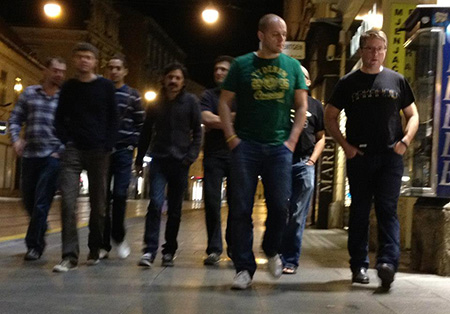I visited 4 amazing cities and met a ton of startup founders and business leaders during my travels with GOAP and the wild and crazy 500 Startups crew the past 2 weeks. Below are my notes. And here are my notes from last year’s trip to South America.
Moscow, Russia
- lots of smart engineers, but most are afraid of the financial risk to work for a startup. Engineers for startups cost more than for big companies because of this risk and they won’t take equity
- cut throat competitive, not collaborative
- very few angel investors
- felt safe walking around the city, the environment did not feel weird like many americans would think… felt like NYC but with strange letters on signs
- expensive city
- Russians smoke like a chimney, like to cut in line, and don’t smile
- big language barrier; startup founders had enough english to do their pitch but having a conversation afterward was hard
- a few big Internet companies like Яндекс and Mail.ru are starting to crank out a new gen of entrepreneurs, however the biggest risk is keeping those people from leaving to start their company in the US
- Russia lacks sufficient logistics/delivery infrastructure to support ecommerce businesses. 2 weeks min to get a product delivered.
- the best startups are run by founders who have spent time in silicon valley
- fun flexible company cultures are rare and a competitive advantage for those that have it
- very cost conscious
- content is expected to be free. Even leaders at the big Internet companies say movies/music/books should be free or cost pennies, and publishers need to get comfortable w/ alt smaller revenue models in order to get any revenue from this market
- PCs, Android & feature phones dominate because of cost. Apple products are <1%.
- big opportunity for Russian entrepreneurs who have worked for or founded tech companies in the US to go back and build companies there “the silicon valley way”
Tallinn, Estonia
- clearly the most progressive tech startup community we visited in Eastern Europe, but also the smallest
- people are friendly and smile & everyone either speaks or understands English
- engineers tend to be more introverted compared to US engineers
- Skype is their darling tech company and extremely important to the startup community.
- similar to the US, lots of competition for engineering talent because of the number of startups
- slow immigration process getting engineers from the EU. Protectionist policies due to being occupied by Russia and before that Germany and others before that
- engineers are able to get their back after leaving Skype to do a startup and then failing. This low risk causes a lot of people to peruse it.
- they go global first starting with US market, because there is no local market
- no B2C, because there is no local market
- 1M people, but “only 1000s of programmers and ~10k IT people”
- Estonians are more like US and western Europe than like Russians. They do not focus on Russian market.
- Estonians hate Russia… at least on a political level
- lack biz dev, enterprise sales & middle management leader — an opportunity for US biz founder types to move to Estonia
- tight community, local mentors helping but they are not experts either. Founders are getting a lot of value going to 500 Startups & TechStars and coming back
- 250 startups, mostly unfunded
- single digit number of local investors
- startup founders club and Garage48 hackathons get founders together and has helped build the community
- opportunity to combine tech communities of Tallinn, Helsinki, Lithuania. Right now they are separate but similar, and many people think they will converge.
- free wifi everywhere and proud of it
Zagreb, Croatia
- nice people, safe country, great food & wine, reasonably good English speaking
- rolled out the red carpet for us
- met with Croatia’s president after he reach out to Dave McClure on facebook
- working really hard to build a startup scene from scratch
- no angels, no coworking spaces, no startup success stories… but starting to manufacture density through events and a coworkimg space coming soon
- like other emerging startup markets, good engineering talent but extreme lack of product, biz dev and enterprise sales talent. Again, and opportunity for the thousands of US biz founders who can’t find a technical cofounder for their startup idea
- hardware startups… a surveillance drone company, and Rimac – a Bugatti-caliber Tesla ($1M)
- local concern that US businesses will be less willing to buy products from Croatian businesses. Not a real concern; its an inferiority complex… this is similar to a college kid trying to build a business out of their dorm room — most US buyers won’t even know you’re not an established US business. A more real risk is that Croatian businesses’ won’t be able to effectively market their product to US buyers because they don’t know the market.
- not many Croatians have been to the US, but are trying to start businesses that sell into the US. They need to start sending entrepreneurs to the US. They just started a hacker house in silicon valley to rotate Croatians and other entrepreneurs in the region through.
- generally the questions asked by Croatian entrepreneurs related to fund raising and company building were very basic
Berlin, Germany
- can’t comment. I skipped this part of the trip and went to Munich for Oktoberfest instead.

